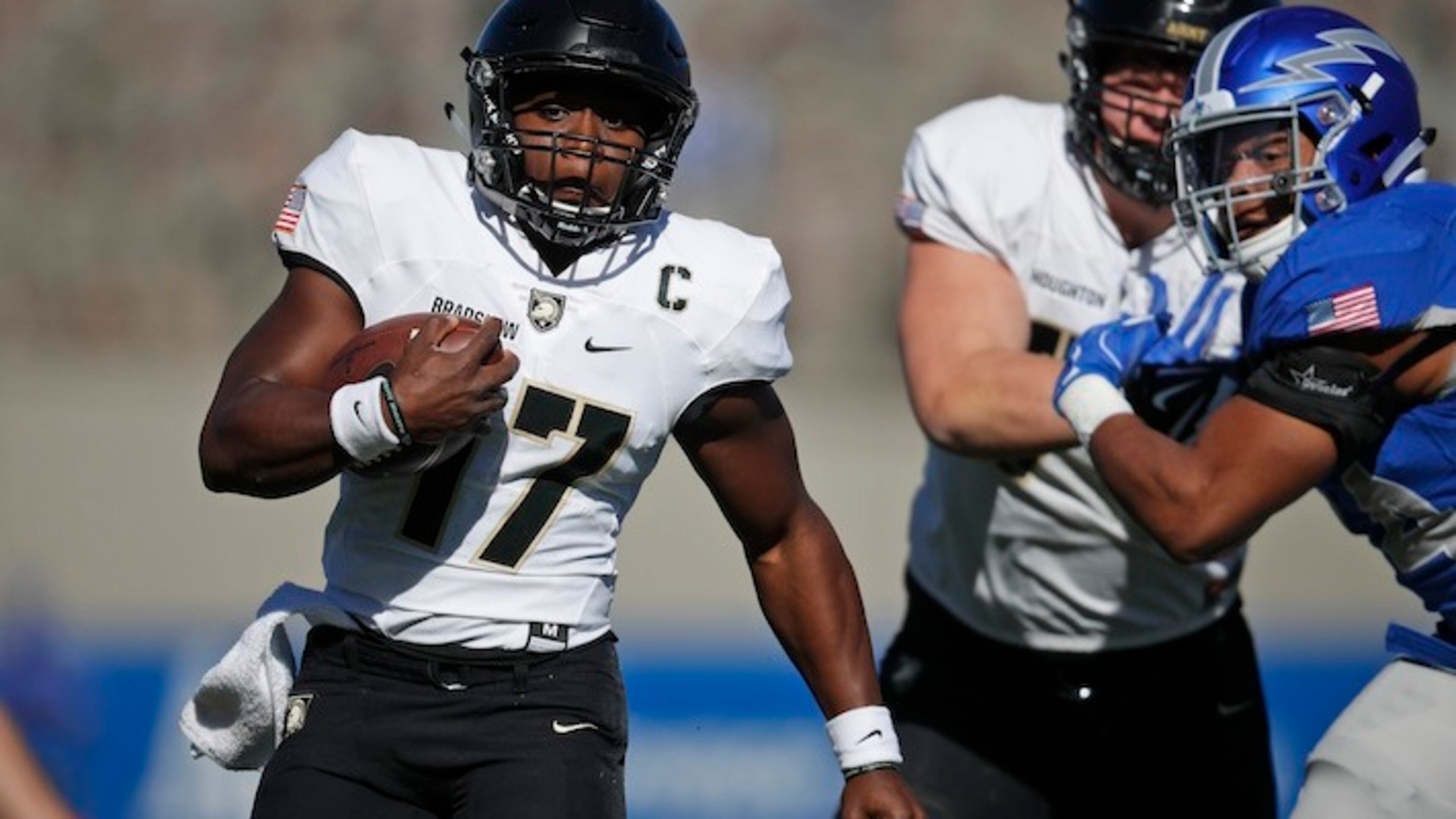Recruiting for football can be a tough sell at West Point

Army quarterback Ahmad Bradshaw likely won't forget the moment he was offered a chance to play football at West Point.
It happened during Bradshaw's junior year in high school on Chicago's South Side when Army assistant coach Tucker Waugh stopped by.
"My head coach took me out of the classroom and introduced me to coach Waugh," Bradshaw recalled. "I said, 'Thank you, sir (for the offer).' Then I kind of whispered to my coach, 'What's West Point?' That was the first time I heard of it."
In this day and age, that's the norm.
Army coach Jeff Monken said most of his players had never heard of West Point when he first recruited them.
"We have a few on our team where this is where they always wanted to go, but very few. I would say it's likely the same at (Navy)," he said.
Welcome to the world of recruiting for football at a service academy, where coaches are tasked with asking prospective players for a commitment like no other — ceding the freedom that teenagers relish, playing for four years at an unfamiliar school then serving a stint in the armed forces, pretty much relinquishing any dreams of playing professionally.
"This is a great place if you can break through the military piece because that's where they get hung up," said Monken, who also was an assistant at Navy under Paul Johnson. "I'm not a military guy. I don't know if the military's for me, and that's always going to be a challenge.
"Ultimately, it's what keeps us from being able to sign a lot of the guys that we go after, and that's the same at Navy as well."
Monken, in his fourth season at Army, thinks the three service academies face the most difficult recruiting challenges in America, in part because they recruit nationally (Army has players from 29 states on its 2017 roster, Navy has players from 32 states and Air Force 21).
Global politics certainly add a dimension not seen at other schools.
"Moms and dads are nervous about their sons coming to the Army and going into ground combat, and I understand that and respect that," said West Point Superintendent Lt. Gen. Robert Caslen Jr., who played center for the Black Knights in the 1970s. "I had a son who went to Iraq and it was really hard for my wife. She started crying, so I do understand."
Waugh and a dozen other coaches divide the country into 13 sections and the initial number of prospects can reach as many as 8,000. Not surprisingly, Army chases a lot of the same players as Navy and Air Force.
"They're fighting for the same things that I'm fighting for. We've all lost players to each other over the years," Waugh said.
Army football is steeped in tradition. It was the AP national champion in 1944 and 1945 and boasts three Heisman Trophy winners — Doc Blanchard in 1945, Glenn Davis in 1946 and Pete Dawkins in 1958. All played during the academy's heyday under Hall of Fame coach Earl "Red" Blaik, who retired after his 1958 squad finished 8-0-1.
The Black Knights remained a winner until the Vietnam War era, but success has been fleeting since.
Caslen, who played on the 1973 Army team that finished 0-10, was recruited by both Army and Navy and says he got an earful of the same advice at his high school in northern Vermont.
"All of my teachers did not go to Vietnam — they found a way not to go — and every single one of them was trying to talk me into going to Navy," Caslen said. "They said, 'Don't go to West Point. You're going to go in the Army and be a baby killer. Go to Navy where you'll be safer on a boat.' That's what they said. I'm sure that's what some of these kids who are also being recruited to Navy and Air Force are being told as well, but that's OK."
Since the turn of this century, Navy and Air Force have dominated the Black Knights in the rivalry among the three academies. Army is 4-30 against its archrivals and before last year's victory over the Midshipmen had lost 14 straight to Navy. The Knights watched as Navy and Air Force regularly played in the postseason.
That the U.S. Army has been involved in military actions in and around the Middle East in each of the past 16 years has an effect on that lackluster performance, according to former Army star Alejandro Villaneuva. Now a fixture on the offensive line for the Pittsburgh Steelers, he's one of the few Black Knights to play in the NFL.
"There's a correlation between us being at war and us losing, there really is," said Villaneuva, who served three tours of duty in Afghanistan and won a Bronze Star Medal for Valor. "If you're in 2006, would you want to go to Army knowing you're 100 percent going to be put at the front lines? Or would you rather go to the Naval Academy ... (where) the chances of you going to actual combat are very limited and easily avoided?
"As a recruit, it influences you a lot," Villanueva said. "I think — and I'm sure — if there's a player deciding between going to the academies, it's something that the Naval Academy can sell, the Air Force Academy can sell even more."
One thing has changed since Villanueva graduated in 2010: Monken has guided Army (8-3) to consecutive winning seasons for the first time since Young's last two years (1989-90). After the Black Knights play Navy on Saturday, they will then chase a second straight bowl victory, too.
"We've been pretty successful the past couple of years," Waugh said. "The high school football players out there are starting to realize more and more who we are."


